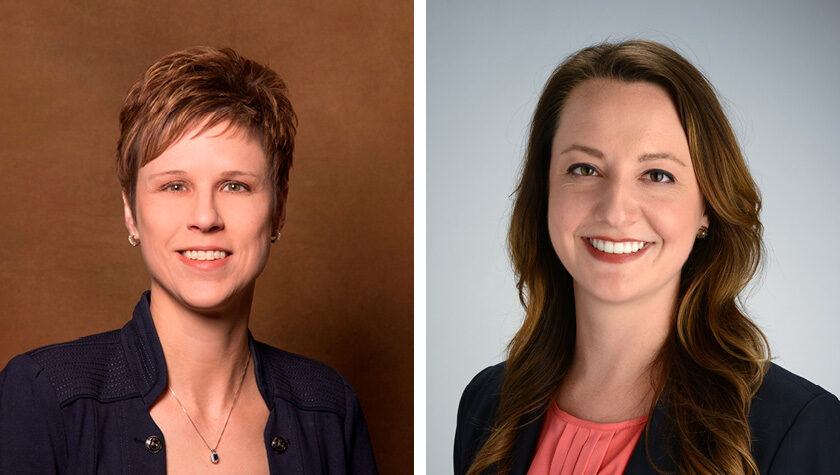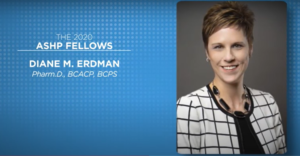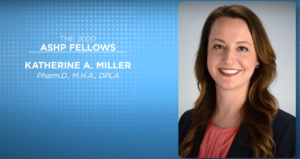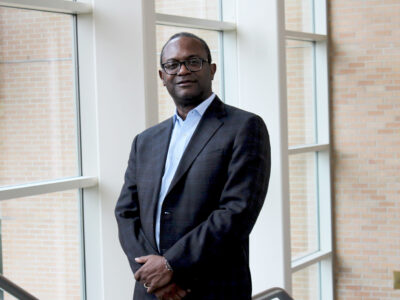
11
September

Diane Erdman and Katherine Miller receive national recognition for their dedication to advancing the profession
By Katie Ginder-Vogel
Of an elite group of 19 pharmacists from around the nation to be inducted as 2020 fellows of the American Society of Health-System Pharmacists (ASHP), two are alumni of the University of Wisconsin–Madison School of Pharmacy: Diane Erdman (PharmD ’97) and Katherine Miller (PharmD ’08).
Achieving ASHP Fellow status is a recognition of their tremendous service to the profession, including contributions to the total body of knowledge in the field, active involvement and leadership in ASHP, and active involvement and commitment to educating practitioners and others.
“I’m honored to be a part of this group of pharmacy professionals across the U.S.,” Erdman says. “The names on that list are the forerunners of pharmacy, and to be part of that is truly humbling.”
Miller says she immediately had an emotional reaction to the news from ASHP. “The first time I typed FASHP behind my name in an email, I had to stop and pause,” she says. “My directors, supervisors, and mentors are all fellows, so it’s super meaningful.”
Erdman and Miller have each filled their careers with a combination of expanding the role of pharmacists and a dedication to mentoring and training the next generation of pharmacists.
Diane Erdman, Ascension
Erdman is the manager of ambulatory care services for Ascension Wisconsin, which is part of the country’s largest Catholic-based not-for-profit health care system that spans 21 states. Erdman has oversight of implementing and sustaining new ambulatory pharmacy services.
“Our mission is to take care of the poor and vulnerable, and pharmacists can help that population by using motivational interviewing, understanding where people are coming from, and identifying how to achieve health outcomes,” Erdman says. “Because we can see patients between clinic visits, we can help both patient and clinician achieve their goals by identifying barriers to receiving medication, working with the patient, and working and within the system to utilize resources to help them get access to medication.”

Her interest in health system pharmacy traces back to her time as a student in the Doctor of Pharmacy program at UW–Madison, which she joined after completing her pre-pharmacy coursework at UW Eau Claire.
In her fourth year, she completed an Advanced Pharmacy Practice Experience with Timothy Hoon at UW Hospital. She says working with Hoon solidified how she synthesizes information about patients and details from medical charts.
“He helped me and two rotation colleagues walk through patients, and it was actually fun,” recalls Erdman. “It was my ambulatory care rotation at the William S. Middleton Memorial Veterans Hospital that set me up with Professor Christine Sorkness and Art Schuna (BS ’73, MS ’75), so I could see how pharmacists could practice at the top of their licenses and impact patient care. That’s what I wanted to do, so I pursued a primary care residency.”
It was also during her time as a PharmD student that she worked with a pharmacist who showed her that it’s OK to not have the answers all the time and admit when you don’t know something.
“That helps build our reputation and opens us up to learn from others, which is important,” she says. “During pharmacy school, in my first experience rounding with physicians, I learned about the large impact pharmacists can have on interdisciplinary teams.”
During Erdman’s primary care specialty residency at the University of Oklahoma Health Sciences Center, she honed her career vision.
“The patient care residency program director and preceptors during my residency helped drive some of my career choices,” she says. “They demonstrated how to successfully build new ambulatory care pharmacy practices, which I have continued to use throughout my career.”
“Our mission is to take care of the poor and vulnerable, and pharmacists can help that population by using motivational interviewing, understanding where people are coming from, and identifying how to achieve health outcomes.”
—Diane Erdman
Erdman got involved with ASHP during her residency at the University of Oklahoma and has been a dedicated member ever since. She served on the Commission on Credentialing and has been a practitioner residency program accreditation surveyor. She helped develop the PGY1 Managed Care Residency Accreditation Standard and Competency Areas, Goals and Objectives.
“My residency program director at the University of Oklahoma, Mark Britton, was a member of the Commission at one time,” says Erdman. “Hearing about his involvement in residency training and the accreditation process inspired me to pursue this, as well.”
Erdman is dedicated to educating and training pharmacy students and pharmacy residents. She credits the ways in which her mentors interacted with residents and students for inspiring her to work with students throughout her career.
“My residency program director and preceptors modeled behaviors of being a successful program director and preceptor,” Erdman says. “Their precepting skills made me want to become a better preceptor and leader in order to give back to the pharmacy profession.”
“I knew I wanted to do that in my career,” she says. “Wherever I’ve gone, I’ve wanted to give back and help train new residents and students like they trained me.”
Katherine Miller, The University of Kansas Health System
Katherine Miller grew up in Wisconsin, and most of her family members are Badgers. She decided to be different and became a Minnesota Golden Gopher, majoring in pre-pharmacy and chemistry.
“My godfather, a pharmacist, joked that I was disowned from the family, but I could redeem myself by going to graduate school at Wisconsin,” Miller says. Her mother was a nurse, which instilled an interest in health care that, coupled with her aptitude for math and chemistry, made pharmacy an ideal option.

Plus, Miller says, “I know the value of a degree from UW.”
Unfortunately, Miller’s godfather passed away unexpectedly a few months before she took her PCAT.
“He never knew that I got into pharmacy school and graduated from his Alma mater,” Miller says. “At his funeral, his patients came. That is an experience that has stayed with me and drives me to be a better pharmacist.”
Now 12 years out from graduation, Miller says the School of Pharmacy prepares student pharmacists to care for patients effectively, and she can see the difference in pharmacists from programs around the country.
“At the UW, there’s a focus on how you interact with other healthcare professionals and on teaching you what you need to know to be an active provider of direct patient care,” says Miller.
Miller’s membership in the Phi Delta Chi pharmacy fraternity and a leadership role as the organization’s Worthy Chief Counselor laid the groundwork for her current career path. She completed her PGY1 residency at the Oregon Health Sciences University in Portland, Oregon, and was determined to be a pediatric pharmacist. However, her mentors — Jennifer Tryon (MS ‘06), graduate of the Master of Health System Pharmacy Administration residency at the School through UW Health, and Justin Konkol (PharmD ’06) — saw qualities in her that suggested she could be a strong administrator.
“They saw in me some of the leadership and administrative skills I’d learned in Phi Delta Chi but wasn’t sure how to apply to the pharmacy world,” says Miller. “They encouraged me to do my second-year residency in pharmacy administration. That’s where I learned the logistics of how pharmacies get drugs in the door, and how to develop and lead people, and that is where my passion has taken me over the last 10 years.”
“At the UW, there’s a focus on how you interact with other healthcare professionals and on teaching you what you need to know to be an active provider of direct patient care.”
—Katherine Miller
Miller completed her master’s in health administration through the ASHP Pharmacy Leadership Academy. She has held operations and management roles at Allina Health in Minneapolis, at University of Chicago Medicine, and now at The University of Kansas Health System. Earlier this year, Miller was inducted as president of the Kansas Council of Health-System Pharmacy.
She hasn’t tied herself down to a particular geographic location and says the flexibility and support her family and friends have given her has allowed her to spread her wings.
“The practice network I’ve formed over the years is how I’ve heard of every single one of my positions and how my last two jobs found me,” she says.
In her current role as director of pharmacy for the University of Kansas Health System, Miller oversees inpatient clinical services for the Kansas City division and supervises the health system’s nine residency programs.
“My job is to lead the managers and coordinators who are doing all the hard work and make sure the pharmacists are working at the tops of their licenses, side by side with nurses and physicians, to take care of patients,” she says. “I recently received an email from a physician in the emergency department, complimenting one of our pharmacists for their partnership on a really difficult clinical patient, and things like that make me smile.”




